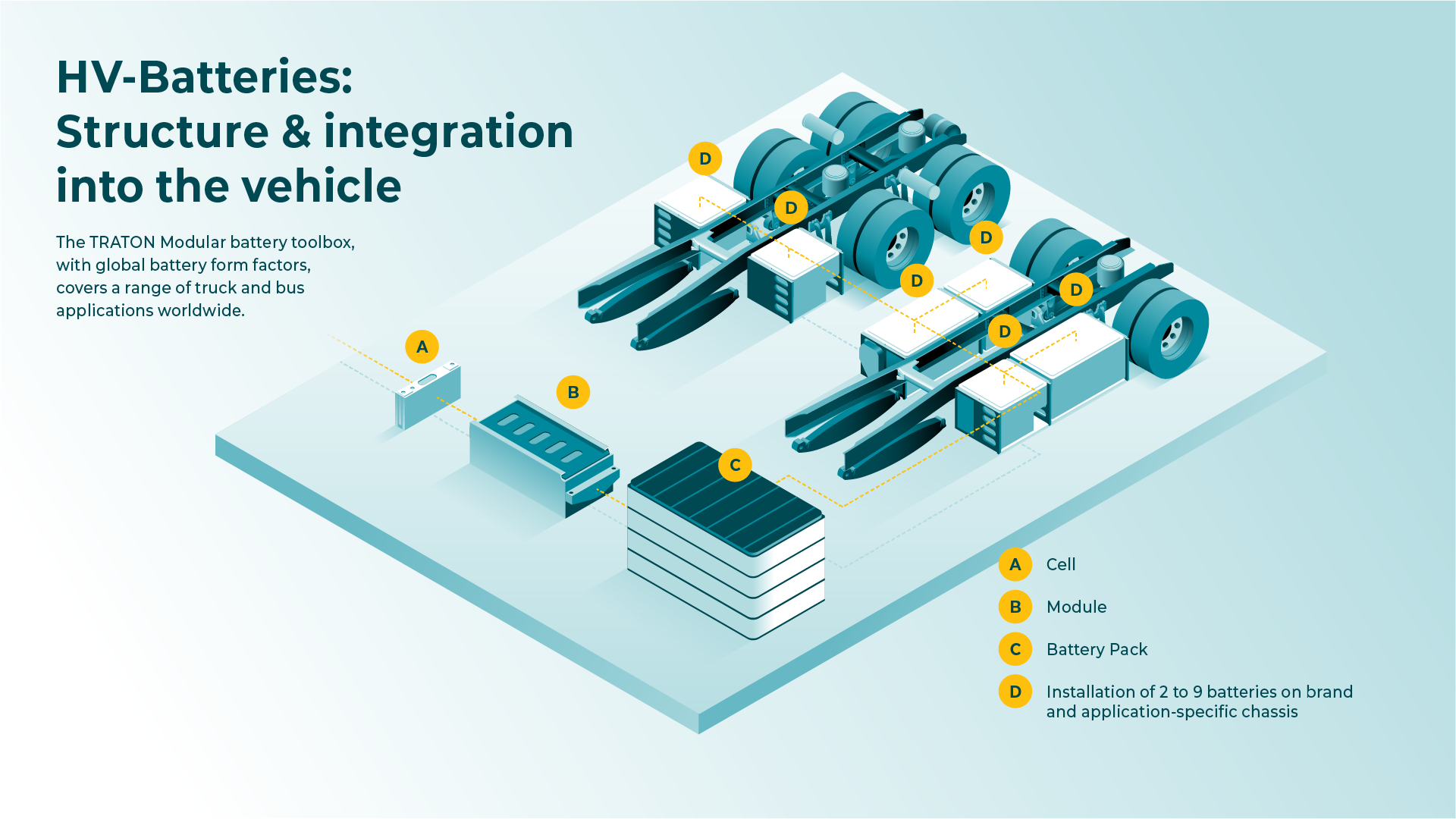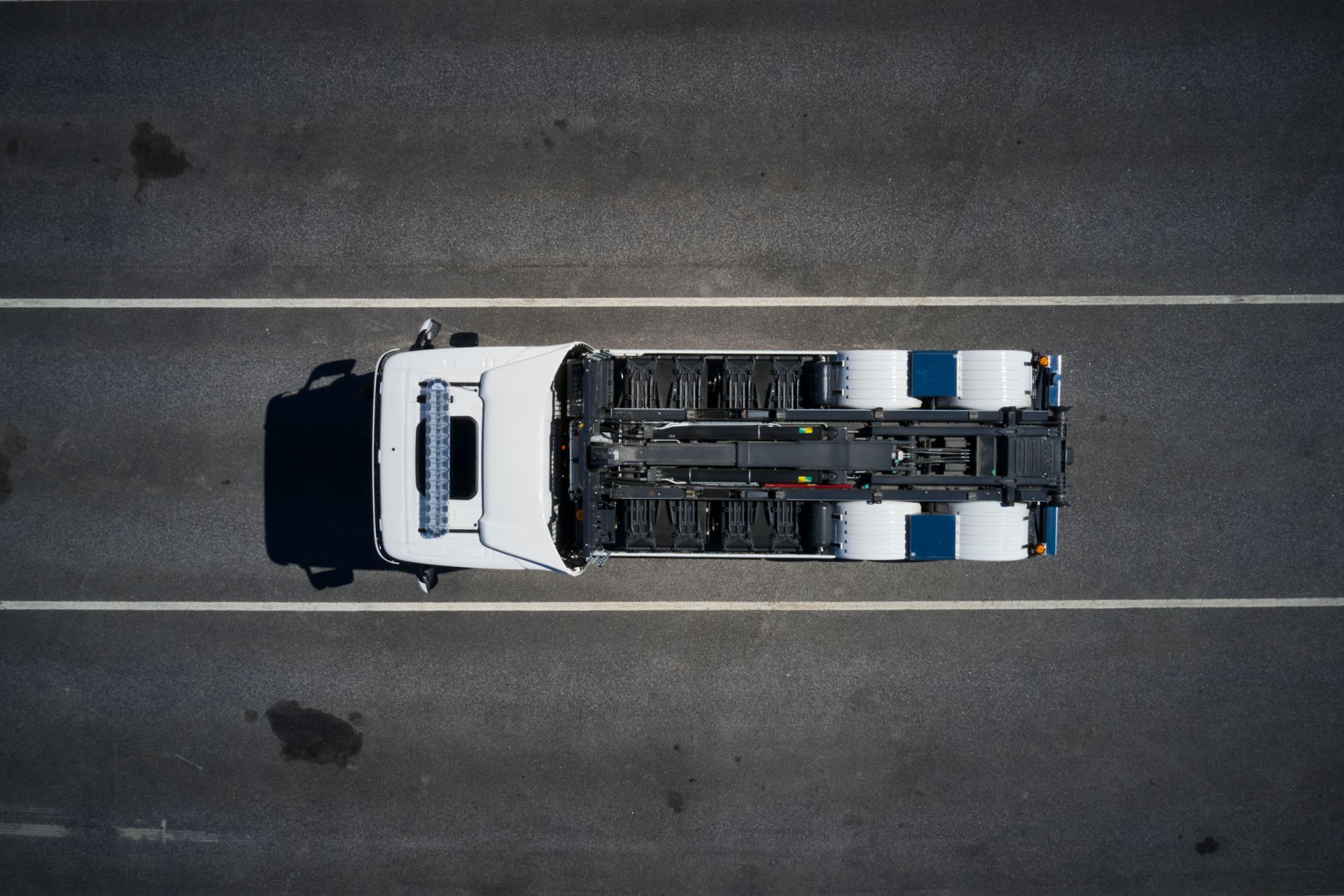Did you know that one million tons of CO2 per year could be saved if 10,000 battery-electric vehicle (BEV) trucks were on our roads, rather than the same number of their diesel counterparts? The technical solutions to achieve this vision are already available. Today’s batteries provide e-trucks and e-buses with ranges of up to 400 kilometers; and 800-kilometer ranges should be possible by 2025 at the latest. TRATON’s MAN Truck & Bus brand is targeting daily ranges of up to 1,000 kilometers for its eTrucks by the second half of the 2030s.
One of the factors driving this development is the recognition that sustainable e-mobility in the commercial vehicle sector is an important building block on the path to successfully combatting climate change. On the other hand, continuous improvements in the development of battery technologies, as well as the development of a comprehensive charging infrastructure, ensure that battery-powered electric vehicles have a clear technical advantage over alternatives such as fuel cell. “Commercial vehicles are a good investment, as they deliver products to customers and often cover long distances in the process. That's why they require the longest possible service life,” says Dr. Götz von Esebeck, Head of Technology Strategy & Innovation in the TRATON GROUP.
TRATON brand Scania recently opened a new battery assembly plant in Södertälje, Sweden. Here, the company’s engineers manufacture battery packs for the commercial BEVs of the future. These batteries, which are assembled from cells manufactured by Scania’s partner Northvolt, are expected to last 1.5 million kilometers, which is equivalent to the average lifetime of a truck. The company has invested the equivalent of around €100 million in the factory. “This is tangible proof of our determination to take a leading role in the electrification of commercial vehicles,” said Ruthger de Vries, Head of Production and Logistics at Scania, at the inauguration of the new plant. Scania intends for 50% of its commercial vehicles to be powered by its own batteries by 2030 at the latest.
.png)
The specific demands placed on truck batteries are creating interest in fresh technologies
A substantial amount of initiative is essential because the battery requirements for heavy-duty commercial vehicles present even greater demands than those of passenger cars. The weight of the payloads alone imposes significantly higher loads on trucks, necessitating a much more robust battery design. In addition, the batteries integrated into commercial BEVs must be able to withstand a significantly higher number of charging cycles, given the comparatively higher mileage of trucks. To put this into perspective, while a truck travels up to 160,000 kilometers per year, the average passenger car travels 200,000 to 300,000 kilometers over its entire service life.
“The unique characteristics pertaining to mileage and charging cycles mean that the mechanical and chemical composition of battery cells, as well as entire battery packs in trucks, substantially differ from those in passenger cars,” explains Dr. Stefan Tillmann, who serves as the Product Manager for Batteries in the TRATON GROUP. Alongside the well-established option of lithium-ion batteries, which are continuously improving, there is potential for other technologies to pique the interest of the commercial vehicle sector in the future. Notably, lithium-sulfur batteries boast a significantly higher energy density, potentially leading to extended ranges for trucks. Similarly, lithium metal batteries offer this possibility. That said, both technologies are currently some distance away from practical application in vehicles. In contrast, solid-state batteries, termed as such because both the electrodes and electrolytes are composed of solid materials, have reached a more advanced stage of development. In addition to a superior energy density, these batteries promise faster charging times and increased safety. However, experts anticipate that such battery types will initially find use primarily within the passenger car sector.
“As a commercial vehicle manufacturer with a global presence, we believe we have an obligation to facilitate the decarbonization of the transportation industry. This is why we are committed to leveraging synergies throughout the entire TRATON GROUP.”
Dr. Götz von Esebeck, Head of Technology Strategy & Innovation bei der TRATON GROUP
Special requirements for safety
Increasingly powerful batteries play a pivotal role in the electrification of drive systems for commercial vehicles. These advanced high-performance accumulators, however, require more stringent safety measures, particularly in the domain of battery cooling. “Batteries generate heat during both the charging and discharging processes. Not only does excessive heating of a battery cell hinder its functionality, in the worst-case scenario, it can even result in a fire or explosion,” says von Esebeck.
TRATON’s engineers address this risk by employing a combination of active and passive battery cooling techniques. In the active approach, a cooling liquid circulates through small channels within the battery. The passive cooling method involves the utilization of materials with excellent heat dissipation properties. Across various TRATON GROUP sites worldwide, such as Scania’s Södertälje plant and MAN’s battery factory in Nuremberg, Germany, dedicated teams are eagerly exploring new strategies to enhance the safety of batteries used in commercial vehicle drive systems.
“The technology is developing very quickly. Batteries are becoming higher quality, safer and cheaper.”
Dr. Stefan Tillmann, Product Manager Batteries bei der TRATON GROUP
“As a commercial vehicle manufacturer with a global presence, we believe we have an obligation to facilitate the decarbonization of the transportation industry. This is why we are committed to leveraging synergies throughout the entire TRATON GROUP,” says von Esebeck. TRATON’s sustainability strategy encompasses plans to recycle up to 90% of the valuable raw materials from its batteries in the future, alongside the utilization of electricity sourced from renewable energy for both battery production and operation.
For the future, the battery experts at TRATON expect the pace of development to continue to grow. “The technology is developing very quickly,” says Stefan Tillmann. “Batteries are becoming higher quality, safer and cheaper.” In addition to innovations in the field of battery cell chemistry, the expert expects further improvements across the areas of battery cooling and battery management systems in the near future. TRATON wants to drive these developments forward by, among other things, focusing even more strongly on innovations that will deliver significant benefits for all its brands. “Pooling our expertise will ultimately benefit the whole group and, above all, our customers.”





